Infoblox vs. BlueCat: Which Solution is Right for You?
Infoblox vs BlueCat head-to-head: Compare features, scalability, DNS security, automation, & more to find the best fit for your enterprise network.
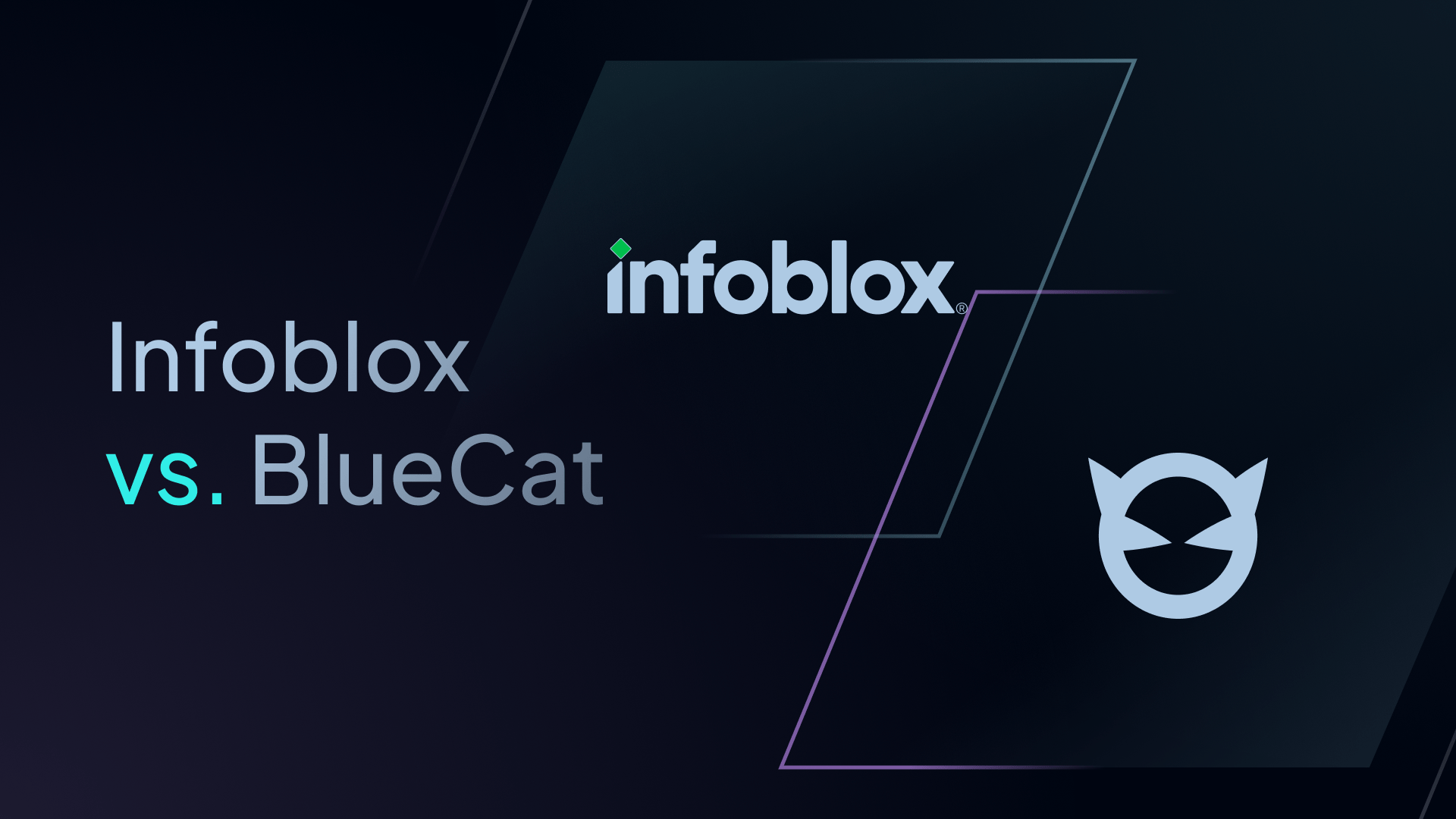
When it comes to DNS, DHCP, and IP Address Management (DDI) solutions, two names consistently dominate the conversations: Infoblox and BlueCat.
Both platforms offer robust DDI management capabilities, but choosing between them requires understanding their unique strengths, limitations, and ideal use cases.
This comparison examines both platforms across key factors, including features, pricing, and performance, to help you decide which solution aligns best with your needs.
Infoblox: Pros and Cons
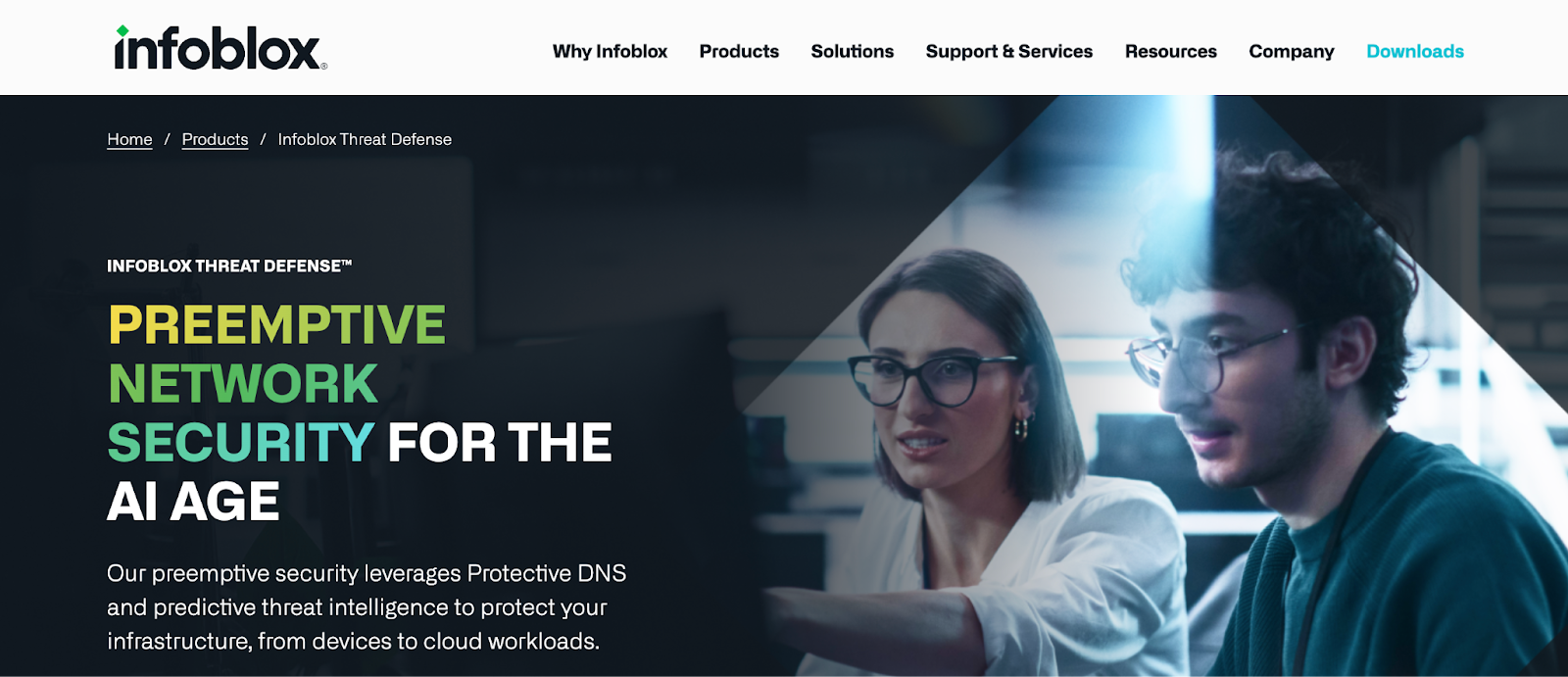
✅ Infoblox Pros
- Mature DDI stack with a proven track record in large-scale deployments
- Grid-based architecture for high availability across multiple locations
- Strong DNS security with threat defense and DDoS protection
- Sophisticated DNS traffic control and real-time data synchronization
- Broad partner ecosystem and enterprise integrations
- Excellent cloud/hybrid deployment options (BloxOne, cloud network automation)
❌ Infoblox Cons
- Premium pricing that’s higher than competitors; some features cost extra
- Complex interface with a steep learning curve, and an extensive feature set that can overwhelm smaller teams
- Traditional hardware-based approach is less suited for cloud-first strategies
- Feature richness may be overkill for simpler network environments
BlueCat Pros and Cons
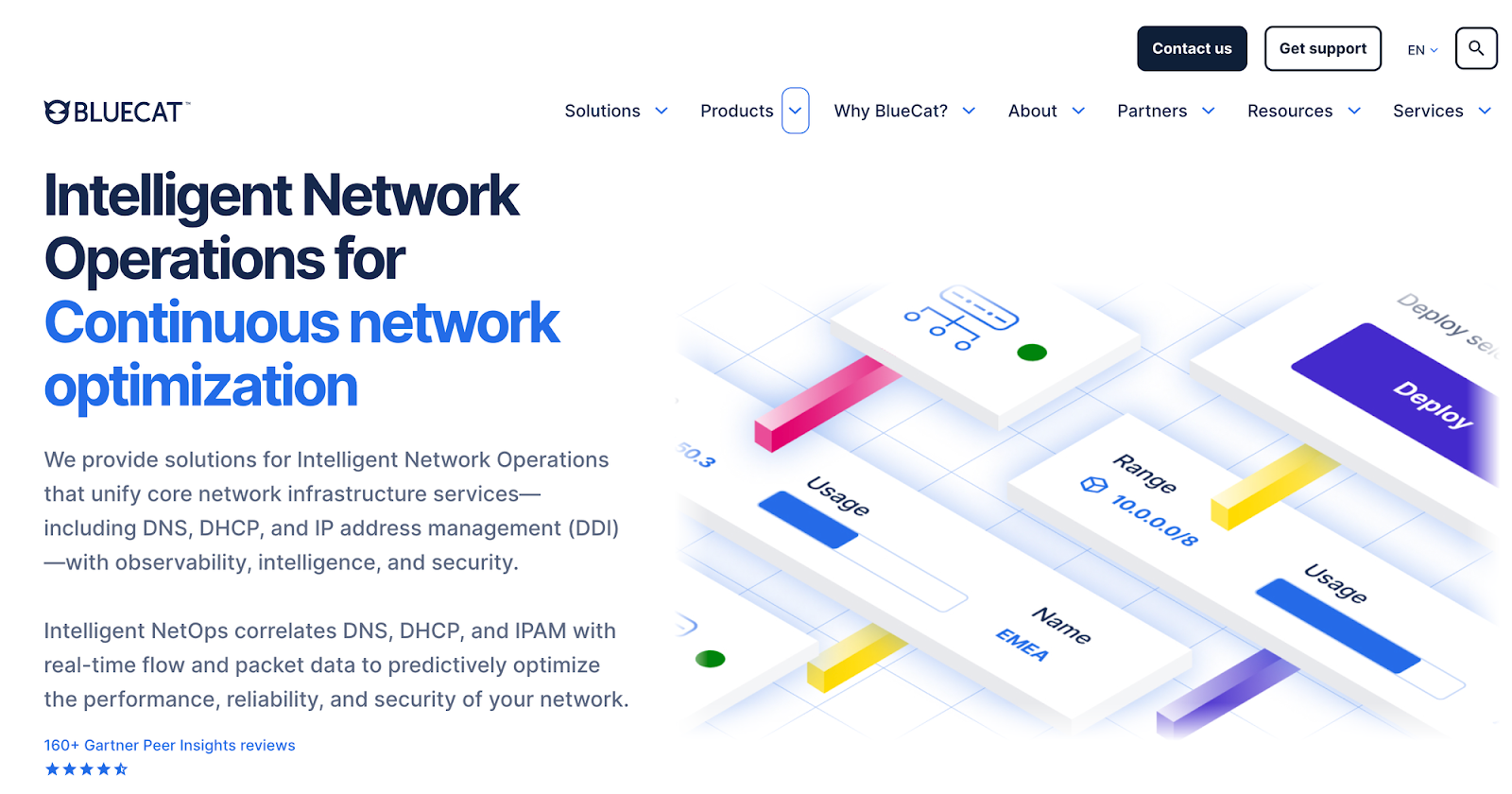
✅ BlueCat Pros
- API-first design with superior automation capabilities for cloud-native organizations.
- Competitive pricing with flexible licensing models
- Adaptive DNS technology for dynamic environments
- Customizable solutions that adapt to existing workflows
- Unified service delivery through a single, intuitive management interface
❌ BlueCat Cons
- Smaller market presence
- Less comprehensive DNS threat intelligence capabilities
- Although it has a user-friendly design, there’s a steep learning curve, especially if customizing heavily
- Complex setup requirements for large-scale deployments
Infoblox vs. BlueCat: Feature Comparison
Let’s break down critical areas and see how both platforms perform in each.
| Category | Infoblox | BlueCat | Winner |
|---|---|---|---|
| DDI Core Platform | Mature platform with tight integration | Integrity platform with unified management | Tie |
| DNS Security | Advanced threat defense & DNS layer protection | Good security features, less comprehensive | 🏆 Infoblox |
| Automation & APIs | Strong workflow automation & vendor integration | Excellent API-first design & automation tools | 🏆 BlueCat |
| Cloud/Hybrid Deployment | BloxOne cloud platform, appliance-based | Flexible software-first, strong API support | 🏆 BlueCat |
| Enterprise Scalability | Grid architecture for global deployments | Multi-tenant support, complex setup at scale | 🏆 Infoblox |
| Ease of Use | Feature-rich but can be complex | Customizable but steep learning curve | Tie |
| Pricing | Premium enterprise pricing | More competitive and flexible licensing | 🏆 BlueCat |
| Support & Ecosystem | Extensive partner network & enterprise support | Smaller ecosystem, but great support feedback | Tie |
DNS Management
Infoblox: Advanced DNS solution with traffic control mechanisms, automated DDI data management, and comprehensive DNS security services. The grid architecture ensures high availability and scalability, which is particularly effective for large enterprises that require fault tolerance across multiple geographical locations.
BlueCat: Adaptive DNS designed for dynamic environments with DNS automation capabilities that manage configurations flexibly and securely. Known for user-friendly interfaces and strong integration capabilities with existing enterprise management tools. It’s better suited for organizations needing extensive DNS automation.
DHCP Management
Infoblox: Highly automated and secure DHCP services with network automation capabilities that enable real-time data synchronization and centralized management. This makes it ideal for organizations with complex network infrastructures.
BlueCat: Resilient DHCP solutions that integrate seamlessly with DNS and IPAM to provide unified service delivery, allowing administrators to manage all related services through a single interface.
IP Address Management (IPAM)
Infoblox: Highly scalable IPAM solutions with strong cloud environment integration. It includes specialized IPAM security features that also protect against DNS tunneling and DDoS attacks.
BlueCat: Emphasizes customization and flexibility with IPAM solutions that adapt to existing workflows and scale according to your specific needs. Provides effective management tools whether networks are static or constantly evolving.
Automation and APIs
There’s no comparison regarding this category; BlueCat's API-first design and automation capabilities are what set it apart. It’s consistently rated higher by users, making it particularly strong for organizations prioritizing integration and workflow automation.
Security Features
Infoblox leads in DNS security thanks to advanced threat defense, DNS layer protection, and comprehensive incident response capabilities.
Cloud and Hybrid Support
Both platforms now offer cloud and hybrid deployment options, though Infoblox's traditional hardware focus contrasts with BlueCat's software-first approach.
Performance and Reliability
Both Infoblox and BlueCat deliver enterprise-grade performance and reliability with consistently high uptime ratings.
Infoblox's purpose-built appliances may offer slight performance advantages in certain scenarios, while BlueCat's software-first approach provides more deployment flexibility.
User reviews consistently rate both platforms highly for stability and performance, with slight variations depending on specific deployment scenarios and requirements.
Pricing Comparison
Infoblox comes with premium pricing that reflects its market-leading position and comprehensive feature set. It's not uncommon to expect higher initial costs.
BlueCat offers more competitive pricing, along with flexible licensing models that include subscription options. Some organizations report better ROI with BlueCat, particularly when factoring in its API and automation benefits.
Exact pricing varies significantly based on deployment size, feature requirements, and contract terms. Both vendors provide custom quotes rather than published pricing.
Customer Satisfaction and Support
Based on verified user reviews:
- Infoblox: 4.6/5 stars (38 reviews on Gartner)
- BlueCat: 4.4/5 stars (140 reviews on Gartner)
Both platforms receive high customer satisfaction ratings, though BlueCat has significantly more recent reviews, which may indicate a stronger market momentum.
How to Choose Between Infoblox and BlueCat?
Both platforms serve enterprise environments well, but their strengths align with different use cases. Choosing between Infoblox and BlueCat will depend on your organization's specific priorities and infrastructure.
| Choose Infoblox When | Choose BlueCat When |
|---|---|
| Large-scale operations across multiple geographical locations | Dynamic environments with frequently changing network requirements |
| Security is critical – need advanced DNS threat defense capabilities built in | Cost optimization is important with flexible licensing needs |
| Regulated industries (finance, healthcare) requiring proven compliance | Hybrid/cloud-first strategy with API-driven automation priorities |
| Complex networks demanding robust enterprise-grade capabilities | Workflow integration – solutions must adapt to existing processes |
| Established ecosystem preference with extensive vendor integrations | UX focus with intuitive interfaces for faster adoption |
As you can see, it depends on whether your organization values Infoblox's security-focused, proven approach or BlueCat's flexibility-oriented, API-heavy approach.
For most large enterprises, the trade-offs may lean toward Infoblox; however, BlueCat might be the best choice if your priorities are centered on flexibility, agility, and hybrid/cloud workflows.
Don’t Need the Full DDI Stack? Here’s the Alternative
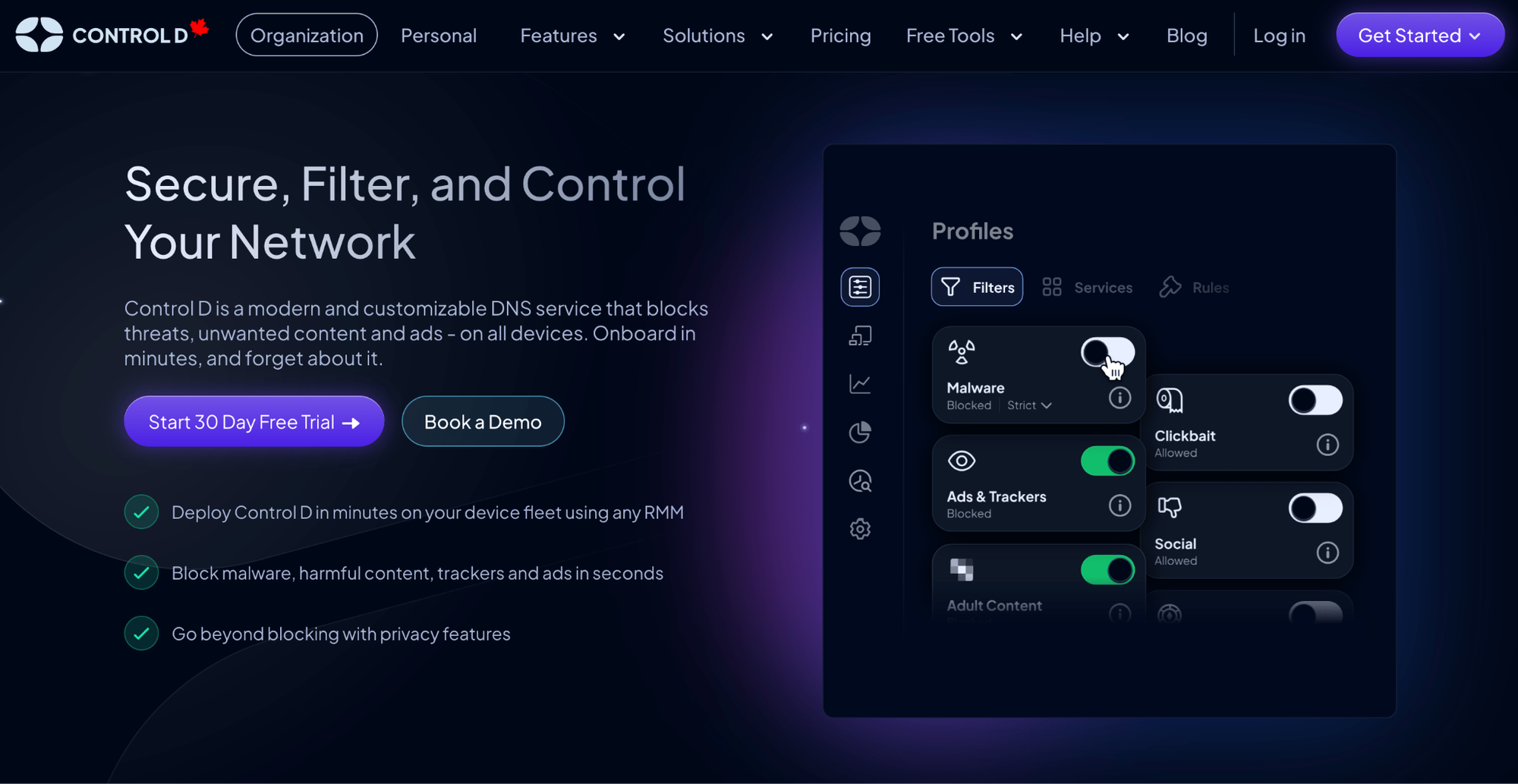
While Infoblox and BlueCat compete as full-scale DDI platforms, you may find that your biggest challenge lies in securing, filtering, and controlling DNS traffic rather than managing the entire DDI stack – that’s where Control D comes in.
Control D is a cloud-based DNS security and management platform that focuses on protecting your network and devices from threats, enforcing access policies, and giving you greater visibility and control over DNS activity.
You can deploy Control D alongside existing DDI deployments to add an extra layer of protection against malware, phishing, and unwanted content, or as a lightweight alternative if you don’t need full-scale DHCP and IPAM capabilities.
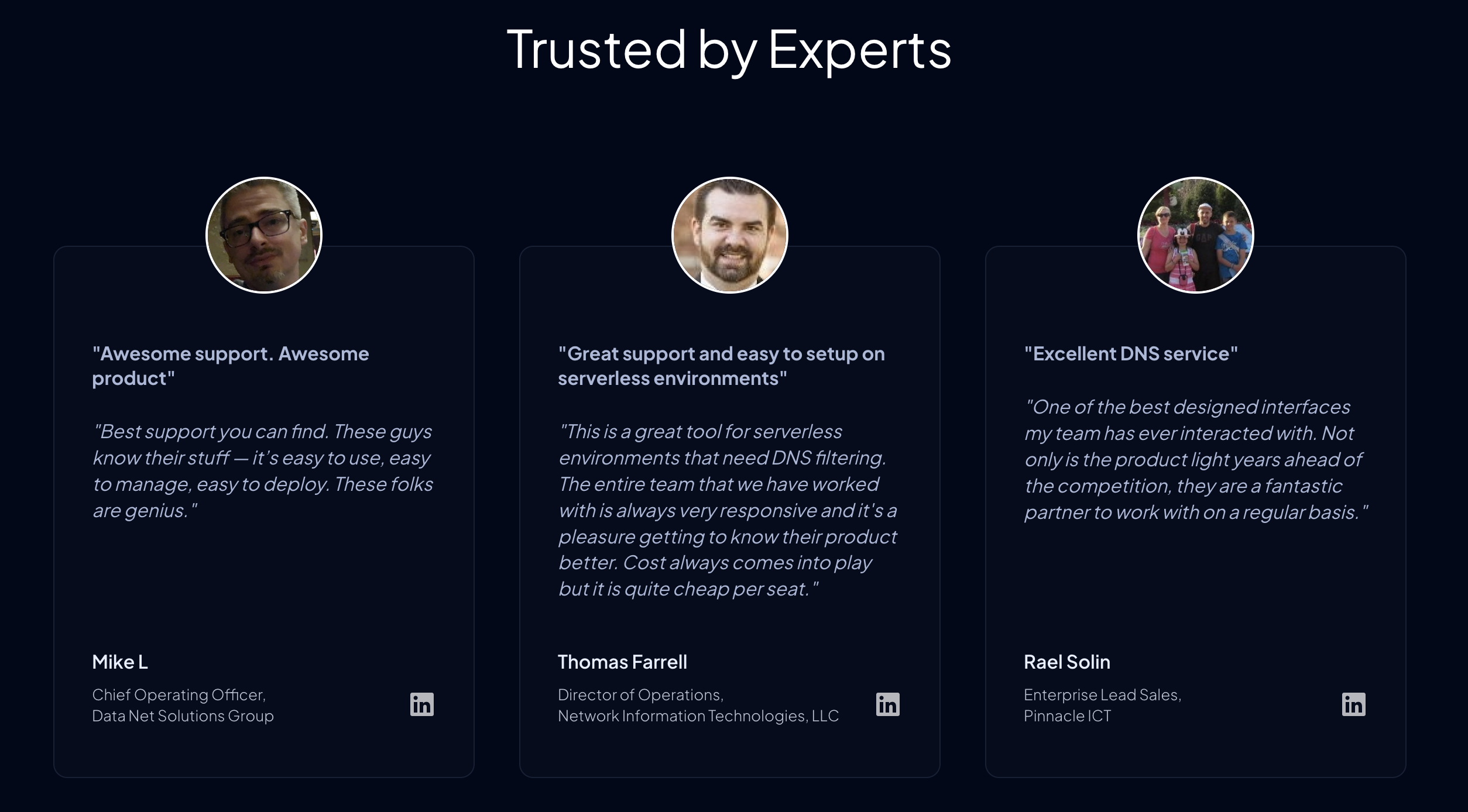
Here’s why Control D is a trusted choice among IT and security professionals:
✅ Best-in-Class Malware Protection – Leverages multiple threat intelligence feeds and machine learning, achieving an independently tested malware block rate of up to 99.98%, making it one of the most effective DNS-based security layers available.
✅ Transparent Pricing & Full Feature Access – A per-endpoint model ($2/month for SMBs, $1/month for MSPs, and $0.5/month for Schools & Non-Profits) with no minimums or hidden fees, and every core feature is available from day one with no upsells.
✅ Granular policy control – Choose from 20 content filtering categories and manage access to 1,000+ individual apps and services with a single toggle – includes DNS-layer ad and tracker blocking to improve page speed, reduce bandwidth use, and strengthen privacy.
✅ Traffic Redirection – Lets you reroute traffic to 100+ proxy locations in 60+ countries, allowing you to mask IP addresses without relying on a VPN.
✅ Geo-Custom Rules – Lets you set IP- and ASN-based filtering rules to give you precise control over traffic routing and compliance with regional requirements.
✅ Multi-Tenancy Support – Enables parent + sub-organization structures, global profiles, and tenant-specific reporting, making it easier for you to manage different users, teams, or clients in a single, centralized dashboard.
✅ Broad Platform Compatibility – Works across Linux, Windows, macOS, iOS, Android, browsers, routers, and more, so you can enforce consistent DNS policies across all network and device types.
✅ Enterprise-ready Protocols – Supports dual-stack networks (IPv4/IPv6) and all modern DNS protocols (DoH, DoT, DoQ, and legacy DNS), ensuring security and compatibility no matter how your infrastructure is built.
✅ Advanced Analytics & Reporting – Gives you real-time query insights, device and application visibility, scheduled reports, and SIEM integration, providing actionable data for faster decision-making.
✅ Full API access – Every dashboard function is available programmatically from day one, allowing you to integrate Control D seamlessly into automation workflows and custom environments.
✅ Easy Deployment – Ships with a lightweight daemon client that avoids common issues like breaking captive portals, enabling quick rollout with minimal disruption.

In short:
- If you need full DDI → Infoblox and BlueCat remain your go-tos.
- If DNS security and filtering are your core priority → Control D gives you a simpler, cost-effective path, either as your primary solution or as an added layer alongside existing DDI.


